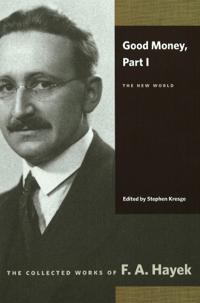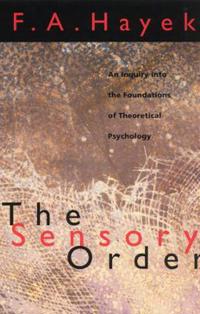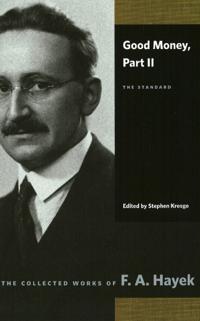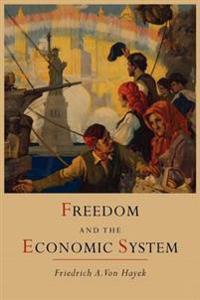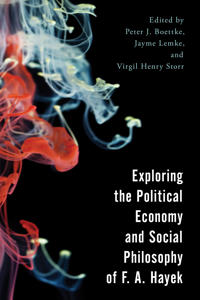Good Money (Pocket)
avF. A. Hayek, Stephen Kresge, F. A. Hayek
ISBN: 9780865977457 - UTGIVEN: 200904Hayek's deep interest in the concept of money and its role within the economy is developed in "Good Money, Part I". Consisting of seven of Hayek's most significant monetary writings from the 1920s, this collection focuses on his critique of the idea that price stabilisation is consistent with the st[...]
The Pure Theory of Capital (Pocket)
avF. A. Hayek, Lawrence H. (EDT) White, F. A. Hayek
ISBN: 9780865978454 - UTGIVEN: 2012-10Hayek's most detailed work in economic theory, "The Pure Theory of Capital" has long been overlooked. First published in 1941, it stood in sharp contrast with fashionable economic thought, which had shifted under the influence of John Maynard Keynes. This publication represents Hayek's last major wo[...]
Law, Legislation and Liberty (Pocket)
avF. A. Hayek
ISBN: 9780226320861 - UTGIVEN: 197806This volume represents This volume represents the first section of Friedrich A. Hayek's comprehensive three-part study of the relations between law and liberty. "Rules and Order" constructs the framework necessary for a critical analysis of prevailing theories of justice and of the conditions which [...]
The Sensory Order (Pocket)
avF. A. Hayek
ISBN: 9780226320946 - UTGIVEN: 199905The Sensory Order, first published in 1952, sets forth F. A. Hayek's classic theory of mind in which he describes the mental mechanism that classifies perceptions that cannot be accounted for by physical laws. Hayek's substantial contribution to theoretical psychology has been addressed in the work [...]
Road to Serfdom (Inbunden)
avF. A. Hayek
ISBN: 9780255365765 - UTGIVEN: 200508In The Road to Serfdom and The Intellectuals and Socialism, Hayek explained the enduring appeal of socialist ideas. Socialism satisfies peoples desire to impose order on the world through central direction rather than allowing an order to develop through individuals autonomous choices. Socialism has[...]
The Constitution of Liberty (Inbunden)
avF. A. Hayek
ISBN: 9780415035309 - UTGIVEN: 200801Originally published in 1960, The Constitution of Liberty delineates and defends the principles of a free society and traces the origin, rise, and decline of the rule of law. Casting a skeptical eye on the growth of the welfare state, Hayek examines the challenges to freedom posed by an ever expandi[...]
The Road to Serfdom (Häftad)
avF. A. Hayek
ISBN: 9780415253895 - UTGIVEN: 200105Addressing economics, fascism, history, socialism and the Holocaust, Hayek unwraps the trappings of socialist ideology. The Road to Serfdom remains one of the all-time classics of twentieth-century intellectual thought.[...]
The Road To Serfdom (Inbunden)
avF. A. Hayek
ISBN: 9780415255431 - UTGIVEN: 2001-05-17Addressing economics, fascism, history, socialism and the Holocaust, Hayek unwraps the trappings of socialist ideology. The Road to Serfdom remains one of the all-time classics of twentieth-century intellectual thought.[...]
The Constitution of Liberty (Storpocket)
avF. A. Hayek
ISBN: 9780415404242 - UTGIVEN: 200609Working after the war, Hayek's writing was very much against the tide of mainstream Keynesian economic thought. But in the 1970s and 1980s - the eras of Thatcherism and Reaganomics - he was championed as a prophet of neo-liberalism by those who were seeking to revolutionize the post-war social conse[...]
Law, Legislation and Liberty (Häftad)
avF. A. Hayek
ISBN: 9780415522298 - UTGIVEN: 201209With a new foreword by Paul Kelly 'I regard Hayek's work as a new opening of the most fundamental debate in the field of political philosophy' - Sir Karl Popper 'This promises to be the crowning work of a scholar who has devoted a lifetime to thinking about society and its values. The entire work m[...]
Good Money (Häftad)
avF. A. Hayek
ISBN: 9780865977464 - UTGIVEN: 200905This complementary volume provides five additional essays to expand our understanding of Hayek's ideas about money and monetary policy. Good Money, Part II: The Standard investigates the consequences of the predicament of composition which led to one of Hayek's most controversial proposals: that gov[...]
Exploring the Political Economy and Social Philosophy of F. A. Hayek
ISBN: 9781786605634 - UTGIVEN: 2018-08This volume critically explore and extend Hayek's Nobel Prize-winning work on knowledge and social interconnectedness from the disciplines of law, economics, philosophy, anthropology, political science, and history. Hayek's insights about knowledge become even more important once it is recognized th[...]
Frihetens grundvalar (e-bok)
avF.A. Hayek
ISBN: 9789187709678I Frihetens grundvalar formulerar F.A. Hayek ett av alla tiders mest övertygande försvar för det fria och öppna samhället. Han analyserar frihetsbegreppets utveckling och välfärdsstatens framväxt och utvecklar teorin om den spontana ordning som uppstår när individer fritt f å r konkurrera[...]
Nyliberal politisk filosofi : En kritisk analys av Milton Friedman, Robert Nozick och F.A. Hayek (Häftad)
avAnna Maria Blomgren
ISBN: 9789188248718 - UTGIVEN: 199701I boken ifrågasätts bilden av en samlad och systematiskt uppbyggd nyliberal politisk filosofi. De stora namnens teorier analyseras ur ett idéhistoriskt perspektiv.
[...]

